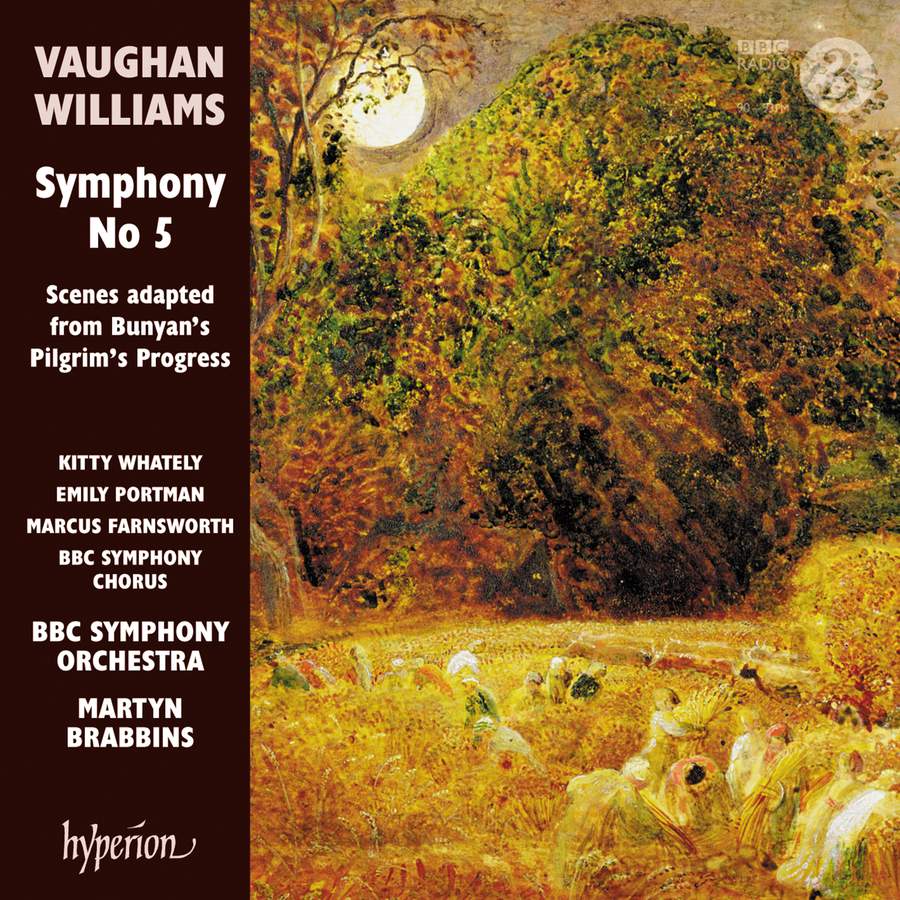VAUGHAN WILLIAMS Symphony No 5 (Brabbins)
View record and artist detailsRecord and Artist Details
Genre:
Orchestral
Label: Hyperion
Magazine Review Date: 12/2020
Media Format: CD or Download
Media Runtime: 66
Mastering:
DDD
Catalogue Number: CDA68325

Tracks:
| Composition | Artist Credit |
|---|---|
| Symphony No. 5 |
Ralph Vaughan Williams, Composer
BBC Symphony Orchestra Martyn Brabbins, Conductor |
| Pilgrim's Journey |
Ralph Vaughan Williams, Composer
Andrew Rupp, Bass BBC Symphony Chorus BBC Symphony Orchestra Christopher Bowen, Tenor Georgina Wheatley, Soprano Jamie W Hall, Bass Kitty Whately, Mezzo soprano Marcus Farnsworth, Baritone Martyn Brabbins, Conductor Tom Raskin, Tenor |
Author: Andrew Achenbach
Martyn Brabbins’s Vaughan Williams symphony cycle continues to go from strength to strength with this impressively cogent, self-effacing Fifth, a reading notable for its unhurried demeanour, clarity of texture and orchestral playing of conspicuous finesse and lustre. Enhanced by sound at once glowing and transparent, the first movement grips from the off; indeed, there’s an enviable wholeness, lofty integrity and sureness of purpose that effortlessly hold the listener. The BBC SO winds are a personable, witty bunch in the Scherzo, which scampers along with both captivating zest and infectious rhythmic point. The ensuing Romanza blossoms into something exceptional, those truly mp cantabile violas and cellos at fig 9’s Pochino più movimento marking (8'29") ushering in a climax of such tonal refulgence and emotional clout that I was reminded of Previn’s classic LSO account (RCA, 3/72). Come the passacaglia finale, and I love the disarming echoes of RVW’s Pastoral Symphony that Brabbins and his eloquent players locate from fig 11 (4'43"), as well as the marvellously unforced inevitability of the return of the opening material – a tremendous sense of homecoming memorably reinforced by the double basses’ bedrock octave pedal D just 15 bars from the end. All told, a scrupulously attentive, uncommonly humane Fifth, utterly free of artifice and, to my mind, deserving of a place alongside Barbirolli (EMI/Warner, 5/44), Boult (Decca, 4/54), the aforementioned Previn, Handley (EMI/Warner, 3/88), and Haitink’s studio and live performances with the LPO from December 1994 (EMI/Warner, 12/95, and LPO, 10/13).
Given the symphony’s inextricable thematic links with Vaughan Williams’s 1951 opera The Pilgrim’s Progress, the coupling could hardly be more intriguing, representing as it does the composer’s earliest musical engagement with Bunyan’s text. For Evelyn Ouless’s 1906 production in Reigate Priory (which adapted a dozen scenes from the first part of the book) Vaughan Williams fashioned some 27 minutes of incidental music. Shining jewel among the six vocal numbers (indeed, of the entire sequence) is unquestionably ‘The Angel’s Song’ (track 11), delivered with exquisite understanding and melting beauty by mezzo-soprano Kitty Whately; moreover, the string-writing here is already wholly characteristic of its creator. Elsewhere, the hymn tune ‘York’ frames proceedings (as it does the opera), ‘The Arming of Christian’ (track 9) incorporates ‘Who would true valour see’ set to one of RVW’s own tunes, ‘Monk’s Gate’ (it also appears in the then newly published The English Hymnal), and in the ‘Final Scene’ (track 16, from 2'14") there’s even a tantalising foretaste of the immortal Tallis Fantasia (whose Gloucester world premiere was still four years distant). In addition, there are excellent contributions from folk singer Emily Portman and baritone Marcus Farnsworth, while Brabbins secures a delectably poised and bright-eyed response from his assembled BBC forces.
A rather special release, this, and emphatically not to be missed.
Discover the world's largest classical music catalogue with Presto Music.

Gramophone Digital Club
- Digital Edition
- Digital Archive
- Reviews Database
- Full website access
From £8.75 / month
Subscribe
Gramophone Full Club
- Print Edition
- Digital Edition
- Digital Archive
- Reviews Database
- Full website access
From £11.00 / month
Subscribe
If you are a library, university or other organisation that would be interested in an institutional subscription to Gramophone please click here for further information.




